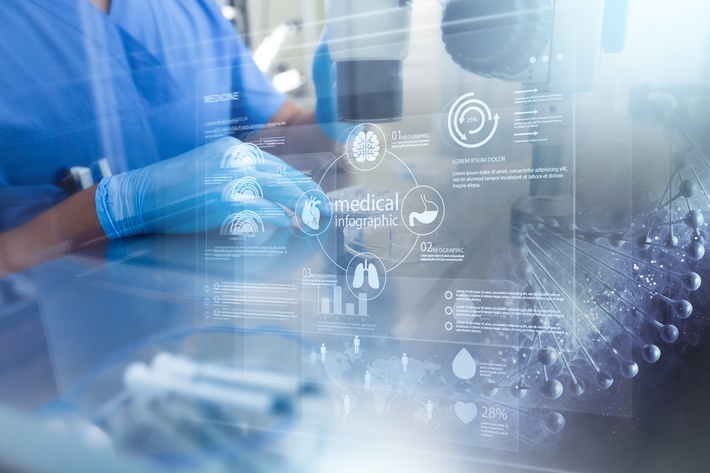
The Healthcare sector is one sector that is always in demand. Lately, the rate and necessity of patient responsibility and innovative medicines have developed. With the growth in such requirements, the latest technologies have been adopted in the industry. One such significant development that had to take place is the application of Big Data and Analytics in the Healthcare sector.
It has been observed that big data are predicted to expand faster in healthcare than in areas like financial services, manufacturing, and so on.
Let Us Understand, What Is Big Data In Healthcare?
Big data in healthcare is a word utilized to explain massive volumes of data generated by the determination of digital technologies that manage patients’ experiences and support in training hospital administration, otherwise too long and heavy for old technologies.
The purpose of big data analytics in healthcare has a lot of definite and also life-saving results. In reality, big-style data relates to the enormous quantities of data generated by the digitization of everything that gets mixed and analyzed by particular technologies. Employed in healthcare, it will use precise health data of a group or an appropriate person and possibly help to stop diseases, cure illness, cut down prices, etc.
Now that we live longer, practice patterns have improved, and many of these changes are particularly inspired by data. Experts need to understand as much as they can about a victim and as early as feasible, to pull up notice signs of severe illness as they appear managing any condition at an early step is far more manageable and less valuable. By appropriating key performance pointers in healthcare and healthcare data analytics, blocking is better than remedy, and training to form a whole picture of a patient will let support produce a tailored set. The industry endeavors to tackle the serious problems a patients data has: everywhere are collected pieces and bites of it and archived in clinics, surgeries, hospitals, and others, with the failure to communicate accurately.
Certainly, for years collecting huge numbers of data for medicinal use has been expensive and time-consuming. With todays always-improving technologies, it becomes more apparent not only to receive such data but also to build overall healthcare statements and transform them into proper crucial insights that can then be utilized to implement better care. It is the purpose of healthcare data analytics: applying data-driven decisions to the divine and solving an issue before it is too late, but also assess methods and treatments faster, keep a better record of the list, include patients more in their health, and approve them with the instruments to do so.
Variable Big Data Applications In Healthcare
The potential of big data is reshaping the aspect and dimensions of various areas, particularly healthcare strangely and unpredictably. Lets see the influential reasons for Big Data in the Healthcare sector.
1) Limiting Human Errors
A lot multiple times- it has been remarked that the experts manage to either prescribe the incorrect medicine or receive a different medication by error. Such flaws, in usual, can be defeated since Big Data can be leveraged to examine user data and the prescribed medicine. It can support the data and flag possible community prescriptions to defeat blunders and save lives. Such software can be a vast machine for physicians who provide too many patients in a single day.
2) Tracking of Health
Big Data and Analytics onward with the Internet of Things (IoT) are transforming the process one can trace different user statistics and vitals. Aside from the essential wearables that can identify the patients dream, exercise, distance hiked, heart rate, and many more. Different medical reforms can control the patients blood pressure, glucose monitors, pulse oximeters, and more. The constant monitoring of the body vitals along with the sensor data store will enable healthcare organizations to put people out of the dispensary since they can recognize latent health issues and give care before the circumstances go more serious.
3) Improving Patient Commitment
Several customers and therefore, possible patients already have an advantage in smart devices that register every move they take, sleeping schedule, heart rates, and much more lastingly. All this necessary data can be linked with other trackable information to recognize possible health risks hiding. Prolonged sleeplessness and a raised heart rate can indicate a prospect for future heart disease for example. Patients are immediately included in the control of their wellness, and influences from health insurance can force them to begin a healthful lifestyle.
Another method to do so appears with different wearables under community, following specific health bearings, and delivering them to the spot where doctors can observe them. Patients experiencing blood tension or asthma could profit from it, and become a bit more self-sufficient and decrease avoidable appointments to the doctor.
4) Decreasing Value
Big Data can be an exceptional way to lessen expenses for hospitals that either above or under-book staff branches. Ominous analysis can improve this problem by foretelling the acceptance rates and assisting with staff allocation. It will decrease the rate of investment acquired by hospitals and in particular, help practices their investment to the max. The insurance business can conserve money by supporting wearables and health trackers to assure that victims do not waste time in the hospital. It can save wait events for patients because the hospital will have sufficient staff and beds available as per the investigation all the time. Forbidding analytics also helps lower costs by decreasing the rate of clinic readmissions.
Final Words
In the upcoming future, the healthcare sector will witness a lot more Big Data applications that will transform the healthcare industry slowly one at a time. Not only will Big Data help streamline the performance of healthcare services, but it will also enable them to improve their aggressive support through forwarding business solutions.
Author Bio:
Karen Smith is Content Manager at Hyperlink InfoSystem, one of the top app development companies in UK. She also writes for App Development Companies platform.
